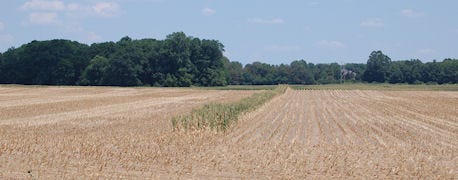
Farmers are mowing down drought stricken corn fields, especially in hard hit areas such as Illinois and Indiana, according to an Associated Press report.
David Kellerman, Dubois, Illinois, says he has had less than an inch of rain since mid-April in his area in the southern part of the state. This week he and the farmer he works with cut and baled his corn fields to use as forage for their cattle, according to the AP report.
Indiana is the state where corn is affected the most by drought and heat. Matt Johnson's popcorn fields in Redkey, Ind., have been burning up by the day, and he expects his insurance adjuster to tell him to mow them over if no rain comes by next month.

TOO LATE FOR HELP: This field is already destroyed, but strips were left for crop adjustors to look at later..
"It's pretty sad," Johnson told the AP. "Everything's just so short, so small. We haven't mowed our yard since sometime in May. We didn't even get an inch of rain in June and haven't gotten an inch yet in July."
Chris Hurt, Purdue University ag economist, confirmed that for the week ending July 8, after the sizzling Fourth of July heat across most of the Corn Belt, that only 12% of Indiana's corn crop was rated good or excellent. More than 60% was poor to very poor, a number overshadowed at this point in the season only by the drought of 1988, when 90% of Indiana's corn was poor or very poor for the same reporting period.
That year the damage bottomed out at that level, and conditions improved slightly with rain in parts of the Corn Belt during late July. Stories of terrible corn and deterioration of the crop are emerging from other states as well. Iowa went from nearly two-thirds of the state rated as good to excellent for corn on July 1, to less than half rated good to excellent on July 8. Decreases in condition were also reported in Nebraska, Illinois and Ohio.
Now comes word that farmers in Iowa are asking crop adjustors if they can mow down corn. Crop adjustors, not crop insurance agents, do the actual inspection and confer with farmers. If an adjustor releases a field, he may ask that strips be left at certain intervals to help in actual yield determination later.
Adjustors are asking that farmers be patient as they begin to file claims. Adjustors expect the workload to be large. In fact, one crop adjustor in Indiana expects that nearly every farmer with crop insurance in the four-county area he services for multiple crop insurance agents will likely file a claim. It will take time to work through the stack of claims, he notes.
In 1998 meaningful rain came to the Corn Bet during the last two weeks of July. Rainfall actually ended up slightly above normal for July in 1988 in Indiana. Let's hope that happens across the Corn Belt this year.
Keep up on the drought Farm Progress is pooling all the coverage of the drought from across the country into a single place - www.DatelineDrought.com - where you can see a daily video from Max Armstrong, Farm Progress director of broadcast, and Farm Futures Senior Editor Bryce Knorr, along with national, local and regional coverage of the ongoing drought across the heart of the country.
About the Author(s)
You May Also Like




